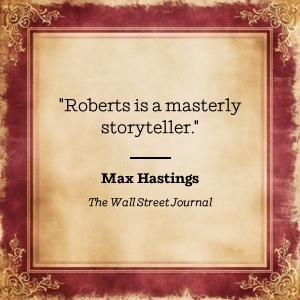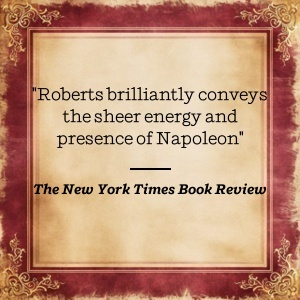معلومات عنا
حقوق الطبع والنشر © 2024 Desertcart Holdings Limited


📖 Own the story behind the legend — Napoleon like you’ve never seen him before!
Napoleon: A Life is a comprehensive, critically acclaimed hardcover biography by Andrew Roberts, spanning over 800 pages and enriched with detailed battle maps and extensive notes. It offers a fresh, deeply researched perspective on Napoleon’s military genius and personal life, supported by hundreds of primary sources. Perfect for history buffs and professionals seeking an immersive, authoritative account of one of Europe’s most influential figures.



| Best Sellers Rank | #8,476 in Books ( See Top 100 in Books ) #3 in Historical France Biographies #4 in French History (Books) #24 in Military Leader Biographies |
| Customer Reviews | 4.6 4.6 out of 5 stars (4,325) |
| Dimensions | 2.3 x 6 x 8.9 inches |
| Edition | Reprint |
| ISBN-10 | 0143127853 |
| ISBN-13 | 978-0143127857 |
| Item Weight | 2.13 pounds |
| Language | English |
| Print length | 976 pages |
| Publication date | October 20, 2015 |
| Publisher | Penguin Books |
| Reading age | 18 years and up |
F**Y
Excellent - Six Stars, A Huge Work About An Immense Life
“Napoleon: A Life” is a vast work that describes the life of Napoleon in great detail. I have tried to read many biographies in my life. Without any question I put this biography in the top tier that I have ever read. I purchased the Kindle and paid extra at the time of purchase for the accompanying audiobook. As I will explain, I am glad that I did both. This is a lengthy detailed book that took me multiple months to read and study. It was worth it. I learned a great deal. It was like a college history course. Years ago I began to assess my actual education and real knowledge. It occurred to me, as an American working man, that I had an abysmal lack of knowledge of European history. I started reading non fiction books on the subject and found that authors would make references to people, places, and things under the assumption that I, the reader, would obviously know what they were talking about. And of course, I did not. In regard to Europe evolving from the Middle Ages to modern Europe, The French Revolution was a gigantic event. Out of The French Revolution eventually emerged Napoleon. Napoleon becomes one of the central figures in bridging Europe of The Middle Ages to Modern Europe. He was not alone and far, far from perfect. But his impact was so immense that eventually all the traditional monarchies of Europe, “The Allies” banned together to stop him. This biography attempts to explain that whirlwind of events. The project would have been too big for me. The reason I am very glad that I purchased the audiobook along with the Kindle is the numerous inevitable foreign, to me, pronunciations. The narration was very professional and was similar to listening to a gifted lecturer. On the other hand, the Kindle provided correct spelling. There are hundreds of footnotes that cannot be included in the audiobook. There are also numerous maps and portraits on the Kindle. For an individual such as myself, doing parallel study, the Kindle proved indispensable. If I was really fluent in French, I might not have needed the audiobook, but I really liked it. In summary I thoroughly enjoyed this combination of Kindle and audiobook. I learned a great deal. From my past reading, if one studies this work and wants to take the next step in Pan European History and incorporating emerging America, one might consider “Diplomacy” by Henry Kissinger. I am going to now reread that work. It does include more than European History, but as I recall it starts with diplomacy at the time of Napoleon and moves forward from there. It is another huge work, another history course. Thank You for taking the time to read this review.
R**R
A must read for military enthusiasts and anyone interested in Napoleon's life and times
A marvelous, unparalleled account of one of history's greatest characters. Andrew Roberts has done what many thought to be impossible - coming up with a new biography on Napoleon that, despite the sheer volume of biographies on him, succeeds in almost every possible way in dethroning the others' and assuming the rightful mantle as the leading book on the subject. Having showered much deserved praise upon this latest entry into this ever growing genre, I have yet to delve in what makes it stand out from the previous installments. Indeed, having previously read Vincent Cronin's masterful account, I only hesitantly got around to reading this book. And oh boy, was it worth it... Let us begin with Roberts' access to a sheer volume of recently published memoranda, memoirs and letters on and of the late emperor which shed some much needed light on Napoleon's character. As stated by the author, all too often is our favourite corsican depicted as an aloof and grave individual, virtually detached from the jovial mundanity typical of the way in which mediterranean people often behave when in private. The same applies for the comradeship, respect and even intimacy he showed to his subordinates, from the higher echelons all the way to the rank-and-file. Then, Roberts' perfect accounts of Napoleon's battles and accompanying maps go a long way in clarifying the state of affairs on the battlefield. Any and all military enthusiasts can and may very well find these chapters utterly enthralling. This is truly a book that is hard to put down, especially after the Italy chapters begin. However, those who can't stand reading to long and detailed battle reports would do well in considering whether this book is the one they ought to read, as it bears the mark of the military historian from start to finish, feeling sometimes more as an exhaustive analysis of Napoleon's campaigns instead of his private life. It's been a while since I read Cronin's book, but I remember him devoting much more time to explaining/analysing other, non-military events surrounding Napoleon or even at other courts (Cronin explicitly retells the Murat melodrama in 1814-1815, which is barely mentioned by Roberts with no context at all provided. While I knew of the affair beforehand, thanks to Cronin's take on the subject, some readers who may be first delving into the subject might be a tad lost in some paragraphs, which could have used a bit more fleshing out). The Zenith Chapter, for instance, was all that was devoted for Napoleon's time as uncontested ruler of Europe, and even then, not even the whole chapter. His wedding options are barely discussed, and of his & Marie Louise's marriage we get to know little - I recall Cronin devoting far more pages to it. Roberts does make up for this in providing the various bits of recently published information mentioned above. There's also the author's masterful prose and pace, which is not to be underestimated in a volume which spans such a length as this one does (over 800 pages of content, plus over a hundred more on notes and bibliography!). Which leads us to the final bit of acclaim: that the author has gone the extra mile to provide us with such a masterful and unrivalled reflects on the bibliography: dozens, if not hundreds of sources - both primary and secondary - have been used by the author to bring about this jewel. His effort deserves every single bit of my praise. One single bit that did bother me was the "britishness" so overly present in some bits of the biography. There was a particular sentence at the final chapter which derided Archduke Charles while showering praise on Wellington, to the point of depicting him as one of the very best military minds of the late 18th and early 19th century. Able as Wellington's command was during the Peninsular War and after the Napoleonic wars, it is difficult to ascertain if he would have been able to cope with Napoleon's pre-1814 genius, which more often than not allowed him to gain the upper hand on other impressive commanders such as the aforementioned Charles, Schwarzenberg, Blücher and Kutuzov. That the very last paragraph of the epilogue is dedicated to Wellington's thoughts on Napoleon, as he were as important a figure as Josephine or even Murat, speaks for itself. The "arch-enemy" relation is hinted in various bits in the book, while I find no reason at all that could compellingly explain why Wellington ought to be deemed as such, having fought only a battle - even if the most decisive one - against the corsican giant. That remark aside, I cannot recommend this book enough - it is a gem amid so many unimaginative biographies, and ought to be read by anyone looking to know more of Napoleon and/or the period. 5/5 stars.
A**R
I was loaned this book in Abidjan and mentioned it to a relative in France which is why I bought it. It contains many facts about Napoleon that I was not aware of, all the more interesting that some of his life was spent around where we have a home. Napoleon is a bit of anachronism. Amazing that he made it as far as he did without getting fired. And yet, a genius whose influence is still felt in many countries around the world today.
J**.
Excelente historiador!!
M**R
My interest in reading this book was primarily concerned with gaining an insight into Napoleon’s military campaigns and with Napoleon as a military leader. However, I soon realized that in addition to being a highly talented battlefield commander - he remained undefeated in 53 of the 60 battles he fought- he was also a capable statesman, reformer, administrator and a patron of the arts. In an age where Feudalism and Serfdom were still prevalent in many European states, Napoleon was an ‘enlightened’ absolutist - creator of the Code Napoléon - who fostered meritocracy, secularism, religious tolerance, and equality before the law. Napoleon’s ambition aptly complemented by his leadership style, ability to inspire men and brilliance on the battlefield made him master of Europe. However, he was not without his vices and could be regarded as the quintessential warmonger, responsible of bringing war and destruction upon Europe for many years. His decline began with his failed invasion of Russia. Also, his enemies learnt from him and applied his methods against him, while he himself began to ignore his own highly successful military maxims. He was finally defeated when much of Europe allied against him and brought an end to his regime in 1815. As the narrative begins with the French revolution in the backdrop, a little prior reading on the French revolution would be helpful in better understanding the initial chapters. Sizable space has been devoted to Napoleon’s campaigns – Marengo, Austerlitz, Jena, Waterloo - and these have been well described by the author at the ‘Operational level’; a level of warfare, the creation of which is credited to Napoleon. However, in the present century it is difficult to visualize how Divisions, Demi Brigades and Line regiments under Napoleon’s famous Marshals - Murat, Davout, Soult, Ney, Lannes, Masséna, Oudinot etc. - were exactly fighting at the tactical level. Thus, the possession of a companion book on Infantry & Cavalry tactics of the Napoleonic wars would greatly aid in better visualizing the various battlefields. I intend to procure such a companion and re-read this book, also as I recently realized that I was in possession of ‘Dictionary of the Napoleonic War’ by David G. Chandler – currently sitting idle in my library- a book if noticed earlier would have made the reading of this volume more enjoyable and educative. Overall, Andrew Roberts’s cradle to grave biography of Napoleon- with Napoleon’s recently published thirty three thousand surviving letters as a source material - is exhaustive in its contents and provides a good account of Napoleon’s professional and personal life, his work, his achievements and his failings. Whether he was an enlightened despot or a quintessential warmongers is to be decided by the readers. Nevertheless, the book is highly recommended for anyone interested in Napoleon.
A**I
Concordo com o jornalista WW que recomendou a leitura. Mesmo sendo um livro de praticamente 1000 páginas, é um livro agradável e que insprime uma vida tão contestada.
K**R
元はイタリア領のコルシカ(後にフランス領)に生まれ、砲兵士官を経てフランス皇帝にまで上りつめ数奇の運命を辿った稀代の英傑の生涯をナポレオン研究の第一人者Andrew Robertsがまとめた一巻完結の伝記。 著者はナポレオンに関する同時代の側近や後世の歴史家が書いた毀誉褒貶を含む数々の文献やナポレオンの著作や33,000通余りにも及ぶ手紙などを精読し、なおかつ、流刑地のエルバ島やセントヘレナ島などの史跡や激戦地だったロシアやオーストリアの古戦場、それらの地の公文書館を訪れて見聞を広めるなどして収集した膨大な知識をもとに生い立ちからセントヘレナで病没するまでを描き切っています。 この本によって、虚飾を剝ぎ取った等身大のナポレオンの実像を知ることができ、さらにはフランス革命やその後の統治体制の変遷、当時のヨーロッパの文化や階級制度、地政学などについて博物学的知識を習得できるのも大きな魅力です。 多くの場合、偉人や英雄は本人の資質だけで勝ち得たものではなく、背景に歴史上の大変革や大事件などの舞台装置が大きく作用している。不出世の英雄と崇められるナポレオンだが、一介の下士官で権力の中枢に結び付く有力なコネも財力もない野心家のナポレオンにとってフランス革命は、立身上のまたとないチャンスだったという意味で「フランス革命の申し子」と言っても過言ではないと思う。 ロベスピエール率いるジャコバン派の恐怖政治によりルイ16世とマリーアントワネット妃が断頭台で処刑されると恐怖に駆られた貴族達は挙って国外に亡命する。同時に貴族の子弟たちが多数を占めるフランス軍の高級将校も身の危険を感じて国外に亡命し、結果として将官級ポストががら空きとなり、ジャコバン派寄りのナポレオンは棚ぼた式の僥倖で若干24歳の若さで旅団将軍(general)に任命される。 その後砲兵司令官となり、王政復古を狙う反乱軍の鎮圧を経てとんとん拍子に地位を高めイタリア遠征軍司令官、さらにエジプト遠征軍司令官としての武勲によりフランス国民の熱狂的支持を得ます。 フランス革命という歴史上の大事件がなければ、貴族士官が主要ポストを占めナポレオンは無名の下級将校でキャリアを終えていたかもしれない。 ナポレオンは弁舌が巧みで兵士の士気を鼓舞することに長けており、戦場でしばしば檄を飛ばして激戦をものにした。曰く「勝敗を左右するのは、兵士の士気が4分の3で残りの4分の1が兵器などの物理的装備」。当時の戦闘形態は白兵戦だったので、多少の誇張はあるものの肯ける。 波乱万丈の風雲児の生涯ですが、史実に基づいた等身大の実像に迫る本なので淡々とした文章でまとめ上げられています。戦争に明け暮れる生涯だったことからこの本の大部分が戦争(軍略、同盟、外交交渉等を含む)や戦場や戦闘シーンで占められており、大作であることに加え戦闘や疫病や餓死などで夥しい数の将兵や戦禍に曝された町や村の住民が命を落とし死屍累々の野ざらしとなる様に心が痛み読み疲れします。 英雄かはたまた独裁者かの線引きは難しいけれど、領土をめぐる争いが絶えなかった時代には、有無を言わさず国民を徴兵で狩り集め戦場に送り込む絶対的権力が必要だった。今日でもカリスマ経営者は合議制を嫌う。 我々は歴史上の偉人や英雄を今日的な社会規範や倫理観を尺度にして評価しがちですが、それらの人物が生きた歴史的背景の下で成し遂げた偉業を評価すべきものなのです。 革命に限らず体制の崩壊や大転換の際には内乱や周辺諸国の武力干渉を招き戦争となるのは歴史の必然。 エンタメではなく歴史の教訓を得るための本だと思うのですが、良書なので一人でも読者を増やしたいという思いが募り長々と書きました。 随所にフランス語が出没するので第二外国語履修程度のフランス語の素養があれば理解が深まります。
ترست بايلوت
منذ أسبوعين
منذ أسبوعين